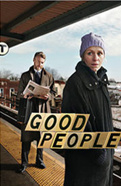What's Up, David Lindsay-Abaire? The Good People Scribe on Nicole Kidman, South Boston's Mystique & More
As David Lindsay-Abaire preps for the Broadway debut of his latest play, Good People, he’s also keeping track of this year’s movie awards. Nicole Kidman is an Oscar nominee for Rabbit Hole, the big-screen adaptation of the play that won Lindsay-Abaire a Pulitzer Prize. Meanwhile, Oscar winner Frances McDormand is in previews at Manhattan Theatre Club’s Samuel J. Friedman Theatre as the playwright’s latest heroine, a single mom from South Boston whose prospects look dim after losing her job at the local Dollar Store. Good People represents Lindsay-Abaire’s first script set in the neighborhood in which he grew up. (He now lives in Brooklyn with his wife and two kids.) The frank and funny scribe recently chatted with Broadway.com about his Boston roots and varied career.
Let’s begin with the Oscars. We know who you’re rooting for…
Yes, Annette Bening. I hope she takes it home. No! Nicole Kidman, of course! [Laughs]
What did Nicole bring to the role of a grieving mom in Rabbit Hole?
She’s one of those unique actresses who can do two things at the same time, especially with a character like this who is so brittle on the surface but deep and soulful underneath. When the camera comes in for a close-up, you know what’s going on beneath that skin of hers.
How much pressure did winning a Pulitzer Prize for Rabbit Hole put on you as you began writing your next play?
None, honestly, because it would mess with my head so badly if I bothered getting caught up in it. The Pulitzer has nothing to do with me; it’s more about people’s perceptions of me, whatever they may be. I’m not being humble—I honestly do not and cannot think about that. It’s a lovely piece of crystal on my bookcase, but that’s all it is to me.
Maybe working on musicals [lyrics for High Fidelity; lyrics and book for Shrek] helps—although a musical presents a different kind of pressure!
I keep changing it up so I’m not pigeonholed, and also to make my work more interesting for myself. Shrek the Musical was about as different from Rabbit Hole as Rabbit Hole was from a farce like Fuddy Meers. I also do film stuff [including the screenplay for Inkheart]. I love to do a bunch of different things. So the pressure—I don’t feel it.
Looking back, do you feel that Shrek was treated fairly in New York?
I wish it had been better received. This may sound naive, but I was surprised how much baggage people walked into the theater with before the curtain went up. Some people, of course, thought, “Another animated movie being turned into a Broadway musical? Give me a break!” Other people thought, “Oh my God, it’s going to be exactly like the movie! I can’t wait to bring the kids.” You’re battling preconceived ideas, so it was very difficult. I loved doing Shrek, and it was fantastic collaborating with [composer] Jeanine [Tesori], but I don’t think that I’ll be adapting another movie into a musical. I want an audience walking in not knowing what they’re going to see, and discovering it the way they do my plays.
Which brings us to Good People. Fans of your writing may be surprised to learn you come from a blue-collar background.
I grew up in the neighborhood the play is set in, South Boston, which is a working class neighborhood.
What happened to your Boston accent?
I got a scholarship to a private school out on the suburbs when I was in the seventh grade, Milton Academy. I went out on the train every day, so my accent sort of got massaged out of me. At the same time, if I talk on the phone to my mother or any relative, it comes back immediately. It’s like being bilingual: The accent is right there, and it’s been a good resource for the cast.
Tate Donovan plays a doctor who left South Boston for a ritzier part of town. Is his character based on you?
Nooooo. Noo. No. No. Can I say “no” one more time? [Laughs.] That’s a character that got out of the neighborhood, but I feel just as much of a connection to Margie [played by Frances McDormand], and to Stevie [Patrick Carroll], the guy who runs the Dollar Store. He’s a version of myself that could have been if I did not get the scholarship. I embrace my background, and I feel like [Tate Donovan’s character] is more ambiguous in his feelings about the neighborhood.
What is it about this neighborhood? The Town, The Fighter...everybody wants to get in on South Boston.
Well, let me correct you. First of all, The Town is set in Charlestown, which is not in South Boston. The Fighter is set in Lowell, which is not South Boston. Gone Baby Gone is set in Dorchester [laughs].
Oops!
The only movie set in South Boston is Good Will Hunting. But there’s definitely something in the ether. Mostly, it’s Ben Affleck. A kid who grew up in Cambridge, of all places, has these romantic ideas about working-class Irish Boston. Actually, his movies are really fantastic. But I hold him personally responsible!
